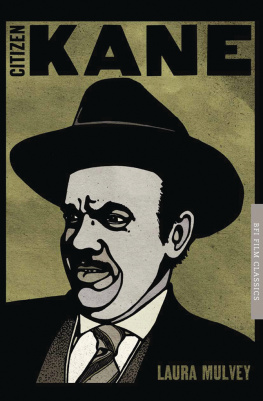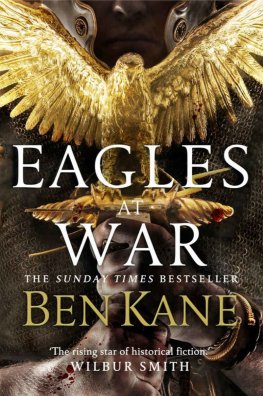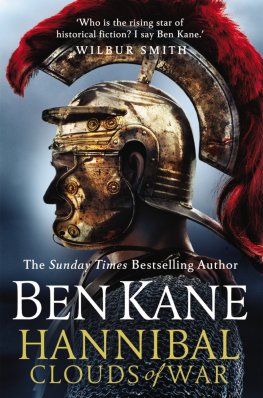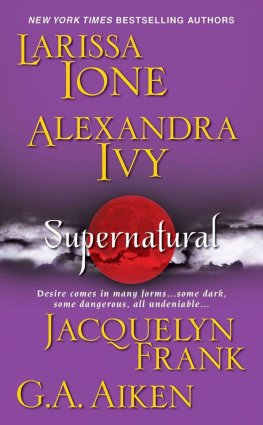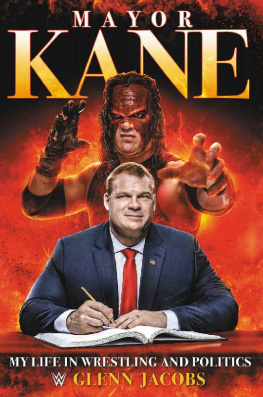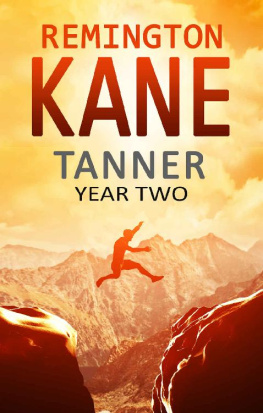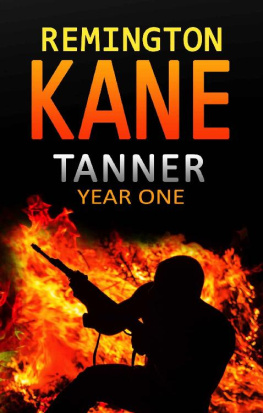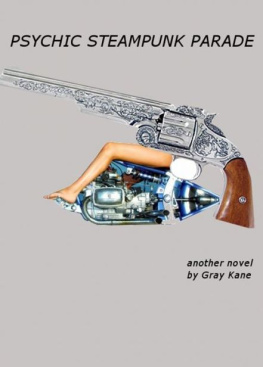Mulvey Laura - Citizen Kane
Here you can read online Mulvey Laura - Citizen Kane full text of the book (entire story) in english for free. Download pdf and epub, get meaning, cover and reviews about this ebook. year: 2019, publisher: BFI Publishing, genre: Home and family. Description of the work, (preface) as well as reviews are available. Best literature library LitArk.com created for fans of good reading and offers a wide selection of genres:
Romance novel
Science fiction
Adventure
Detective
Science
History
Home and family
Prose
Art
Politics
Computer
Non-fiction
Religion
Business
Children
Humor
Choose a favorite category and find really read worthwhile books. Enjoy immersion in the world of imagination, feel the emotions of the characters or learn something new for yourself, make an fascinating discovery.
- Book:Citizen Kane
- Author:
- Publisher:BFI Publishing
- Genre:
- Year:2019
- Rating:5 / 5
- Favourites:Add to favourites
- Your mark:
- 100
- 1
- 2
- 3
- 4
- 5
Citizen Kane: summary, description and annotation
We offer to read an annotation, description, summary or preface (depends on what the author of the book "Citizen Kane" wrote himself). If you haven't found the necessary information about the book — write in the comments, we will try to find it.
Citizen Kane — read online for free the complete book (whole text) full work
Below is the text of the book, divided by pages. System saving the place of the last page read, allows you to conveniently read the book "Citizen Kane" online for free, without having to search again every time where you left off. Put a bookmark, and you can go to the page where you finished reading at any time.
Font size:
Interval:
Bookmark:

BFI Film Classics: A brief history
The BFI Film Classics series grew out of a project initiated by the National Film and Television Archive (NFTVA), a division of the BFI, to build a collection of perfect showprints of 360 key films in the history of cinema. These films were to be screened at the Museum of the Moving Image (MOMI) in London in a year-round repertory. The 360 list of classic films was drawn up by David Meeker of the NFTVA, and the BFI Film Classics books were commissioned to stand alongside the Archive project.
Distinguished film critics and scholars, film-makers, novelists and poets, historians and writers from other spheres of the arts and academia were approached to write on a film of their choice from the 360 list. Each volume was to present the authors own insights into the chosen film, together with a brief production history and detailed credits, notes and bibliography. In a time before DVDs and screengrabs, the books numerous illustrations were specially made from the Archives own prints and sourced from the BFIs stills collection.
The series was developed and its first titles commissioned by Edward Buscombe, then Head of Publishing at the BFI. Colin MacCabe and David Meeker acted as series consultants. Rob White was the Series Editor at the BFI from 1996 to 2005.
The series was launched in May 1992 with four titles: The Wizard of Oz by Salman Rushdie; Double Indemnity by Richard Schickel; Stagecoach by Edward Buscombe and Went the Day Well? by Penelope Houston.
A sister series, BFI Modern Classics, was launched in 1996 to respond to notable films of modern and contemporary cinema. Over 60 titles were published in this series before it was absorbed within the main Film Classics series in 2007, and the combined series was relaunched with a new cover and text design. There are currently over 160 titles in print in the Film Classics, Modern Classics and combined Film Classics series.

At home in Xanadu

Contents
When I wrote the BFI Film Classic Citizen Kane, I was interested in giving greater visibility to the politics of the immediate pre-war period in the United States in order to throw light on some of the allegorical aspects of the film. Returning to Citizen Kane to write this foreword, I have also returned to these questions of visibility and invisibility. Although the spectre of William Randolph Hearst loomed over the films release in 1941 and had continued to figure in popular awareness, his actual significance for Citizen Kane had become less visible. I argued that it was Hearsts right-wing political position in the 1930s (hostile to the New Deal and American intervention in the war in Europe) that provided the rationale for Welless satirical portrait of a newspaper tycoon. As happens so often with allegory and satire, once a frame of reference is lost, the surface text floats away from its historical context. As time passed, there would be no reason for Citizen Kanes spectators (particularly those outside the US) to relate the film to the polarised politics of the 1930s, especially when watching a film of such aesthetic coherence and cinematic sophistication.
But returning to the film now, its politics seem to have gained in visibility. This has become clear to me as I contrast the changes in popular consciousness about the power of the newspaper tycoon over the last twenty years. Purely by coincidence, I wrote Citizen Kane in 1991, the fiftieth anniversary year of its release in 1941. Purely by another coincidence, I am writing this foreword in 2011, in its seventieth anniversary year. Although fundamentally arbitrary, these dates highlight a relationship between then (1941, 1991) and now (2011). In 1991, the time of Citizen Kane and Welless political preoccupations seemed remote. In 2011, due to the recent public focus on Rupert Murdoch and his empire, the film has gained in topicality, while, at the same time, the economic crisis has revived debates current in the 1930s. Furthermore, Welless 1941 statement to the press (denying that Hearst was the model for the fictional Charles Foster Kane), has also acquired contemporary relevance.
Mark Twain remarked: History doesnt repeat itself, but it does rhyme. Broadly speaking, the recent developments I mentioned above have brought the historical context of Citizen Kane into a rhyming relationship with 2011. In his statement to the press, Welles hammers home two important points about the political dangers posed by his newspaper tycoon. First, the kind of general and catholic power with which I wished to invest my particular character could only be achieved, in a democracy, by the control of newspapers; secondly, he would wish to use his money for the exercise of power and be a man interested in imposing his will on the will of his fellow countrymen. This indictment of the power of the press not only goes beyond the specificity of the portrait, but it also generalises its relevance. In 1991, a connection from my time of writing back to the US press barons of that earlier period was not in the forefront of my mind. But in 2011, the rhymes between Hearsts opposition to the New Deal and the recent upsurge in conservative politics supported by Rupert Murdochs Fox News in the US and News Corporation in many other parts of the world are more apparent. This context also gives greater visibility to a further rhyme between Murdoch and Hearst: their shared hostility to trade unions. In 1991, I overlooked Hearsts long-standing animosity to the union movement in general (and in particular his opposition to Roosevelts pro-union legislation in the 1930s) that might have resonated with Murdochs victory over the print unions as he moved production of his newspapers from Fleet Street to Wapping in 1986.
As the economic policies of the Obama presidency have given the terminology and aspirations of Keynesianism contemporary currency, so the rhyme returns in relations between politics and the press. Obamas early attempts to evoke the rhetoric and, in part, the politics of the New Deal were met with ferocious hostility by Fox News, which initiated and participated in personal attacks against him and more generally his policies. Launched in 1996, Fox News had become a major force in the formation of public opinion during the Iraq War. The Spanish-American War over Cuba in 1898 fuelled the 1890s rise of the yellow press, supported by the historical Hearst and the fictional Kane: Kane (echoing Hearst to Remington) telegraphs: Dear Wheeler, you provide the prose poems, Ill provide the war. This attitude, jingoistic as it was known at the time, resonates vividly across more than a century to Fox News present attempts to whip up an American attack on Iran, pressuring the candidates in the coming Republican primaries, and no doubt the candidates in the coming presidential election, to take a stand on the Iran/Al Qaeda connection. Commenting on Hearsts complete indifference to truth, Gore Vidal pointed out, History is what you say it is in the popular press, and Fox News faithfully continues this maxim.
Kane triumphantly converts the New York Inquirer into a scandal-driven, as well as muck-racking, newspaper, something that rhymes once again with recent revelations about widespread phone hacking by News of the World
Font size:
Interval:
Bookmark:
Similar books «Citizen Kane»
Look at similar books to Citizen Kane. We have selected literature similar in name and meaning in the hope of providing readers with more options to find new, interesting, not yet read works.
Discussion, reviews of the book Citizen Kane and just readers' own opinions. Leave your comments, write what you think about the work, its meaning or the main characters. Specify what exactly you liked and what you didn't like, and why you think so.

